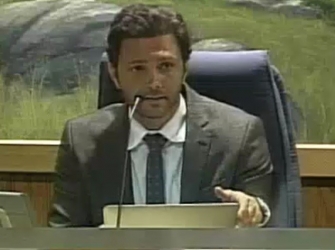
By Paul Kruze
August 19, 2017 (El Cajon) -- Yet more eyes are going to be fixed on embattled El Cajon Councilman Ben Kalasho with news that he has filed a discrimination complaint with the State of California Department of Fair Employment and Housing. The action follows last Tuesday’s 4-1 vote affirming that the only electronic device permitted to be used by Council members at the dais during City Council meetings are city-provided Apple iPad tablets.
The iPads provided to members of the City Council will be configured to only allow access to City of El Cajon official websites and access to the city’s financial budget documents and municipal codes, but other Internet sites will be blocked. Note-taking software will be downloaded onto the iPads and an attached keyboard will be provided.
The move to address use of personal electronic devices during council meetings by council members came about when El Cajon mayor Bill Wells expressed concern several months ago that private communications may be happening between council members themselves and the public during its bi-monthly meetings.
The City of Escondido is the only other San Diego County municipality that has taken similar steps to stop the use of personal electronic devices by Council members while seated at the Council’s dais. According to Teresa M. Collins, Communications Officer for the City of Escondido, the City Council and Escondido’s mayor, Sam Abed, made the issue a priority to comply with the State of California’s Open Meetings law, also known as the “Brown Act.”
“We needed to make sure that we were in compliance with the rules already established,” she said.
Under the Brown Act, a violation of that law may occur when“a series of communications of any kind, directly or through intermediaries” is used by a majority of the members of an agency to “discuss, deliberate, or take action on any item of business that is within the subject matter jurisdiction of the legislative body.” (Gov. Code section 54952.2(b)(1).)
Collins also said that compliance with the Brown Act requires that any text or email communications that occurs between Council members and/or city-employed staff during the meeting must be made public, since they were sent during the public meeting.
A website published by the First Amendment Coalition suggests that if a council is made up of five people and three are communicating with each other outside of the confines of a publicly noticed meeting, then this would be a violation of the Brown Act. Such communications includes those dispatched by email and thus it would seem that the same would apply to text messages between various members of a particular board or council.
In addition to the city of Escondido, the cities of Palm Desert, Lake Elsinore and Anaheim have adopted specific rules banning or limiting city council members from using personal cell phones and electronic tablets during meetings.
According to a San Diego Union-Tribune article published on August 9, Kalasho provided the El Cajon City Attorney’s office a note sent to him by the Department of Fair Employment and Housing thanking him for his “pre-complaint inquiry” and advising him to allow two to three months to be contacted by the department with more information and instructions on how to proceed.
But the chance that Kalasho would could win a discrimination suit against the city because he was not allowed to use a personal electronic device during city council meetings is zero, says Josh Gruenberg, a leading San Diego attorney who specializes in employee and employee discrimination law.
“This is not discrimination,” he told East County Magazine. “Anyone can use the word ‘discrimination.’ In a general context, discrimination means being treated differently than anyone else. The law treats the word entirely differently. In the legal context, discrimination is only illegal if it is being done for an illegal reason. What I would say is that someone can be can be discriminated against based on age, race, sex, national origin, religion, medical condition, veterans’ status, and so on,” Gruenberg said. “Taking notes at a meeting or having your head down looking down at your iPhone is not one of the protected characteristics of discrimination law,” he said.
As reported previously by East County Magazine, El Cajon City Attorney Morgan Foley directly questioned Kalasho about his threats to file a discrimination complaint against the City of El Cajon during the recent Council session. “And discrimination is because you can’t use an iPad like anybody else or is it because you’re being told you have to use this particular iPad?”
Kalasho replied that because of his political affiliation with the Democratic party, this could be grounds for a complaint, noting that he is the only El Cajon City Council member who uses an electronic device to take notes during Council meetings. He has claimed that transferring notes between a city-issued iPad and his personal device would be too “burdensome.”
East County Magazine asked Kalasho for a comment, but he did not respond to multiple inquiries.
Twitter & Facebook: PaulKruzeNews













Comments
BARRIER TO PARTICIPATION
Here we have an example of just one of the walls that keep most Americans from participating in their government. Most of us can not afford to hire an attorney, to represent us in disputes like this. Many politicians are involved in several legal cases. At the higher levels of political involvement, one needs to staff a personal legal organization. Most Americans can't afford the price of that ticket.